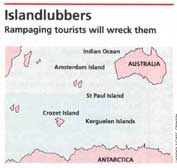Hunting clubs on pleasure islands
 AMSTERDAM, St Paul, Kerguelen and Crozet, the French-governed sub-Antarctic group of islands in the southern Indian Ocean, are crawling with some of the world's richest wildlife diversity. Now, biologists who have been camping in the islands to study the fauna are accusing the administration of the French Southern and Antarctic Territories (TAAF), which looks after the affairs of the islands, of knuckling in to tourism. Threatening to spark of a storm of protest, 29 scientists submitted a petition in end-January urging the French government to declare the entire area a protected zone.
AMSTERDAM, St Paul, Kerguelen and Crozet, the French-governed sub-Antarctic group of islands in the southern Indian Ocean, are crawling with some of the world's richest wildlife diversity. Now, biologists who have been camping in the islands to study the fauna are accusing the administration of the French Southern and Antarctic Territories (TAAF), which looks after the affairs of the islands, of knuckling in to tourism. Threatening to spark of a storm of protest, 29 scientists submitted a petition in end-January urging the French government to declare the entire area a protected zone.
The government had raised hackles by announcing its decision to promote tourism, hunting and sheep-farming on the islands, primarily to get rid of a surplus population of mouflon -- the wild sheep in Kerguelen -- which it claims has stripped the island's natural vegetation. Biologists, however, say angrily that previous attempts to set up commercial operations have always failed and led to ecological disasters.
They have reason to fret. This group of islands is considered too precious to be allowed to be ravaged by profit-hungry business interests. The Crozet archipelago, for instance, has 37 species of seabirds, including petrel, albatross and penguin, making it the world's richest collection of seabird species. Scientists are worried that the islands will soon be transformed into "private and lucrative hunting clubs, like those that existed in Africa 40 years ago". Although it costs a staggering us $9,360 to reach the islands by boat from La Reunion in the central Indian Ocean, enthusiastic hunters flashing wads of notes will pay up if the carrot -- capturing mouflon in such exotic locations -- is dangled before them.
TAAF, however, is highly indignant about the protest movement brewing in the scientist community. Henri Goetschy, the French senator from Alsace, who oversees the TAAF budget, says that the biologists have "distorted the facts", and that the schemes are aimed at improving the environment and opening up the islands to the outside world. "The TAAF is a sort of extraordinary national park. What use is a reserve if it remains private for only a few to see?" he asks. And, anyway, who wants islands in the sun?
